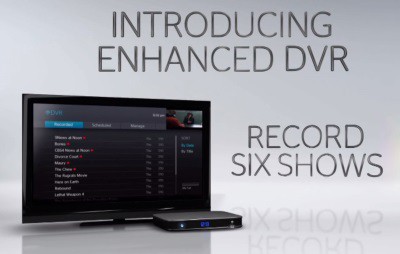
Time Warner’s Enhanced DVR works fine, but those avoiding TWC equipment run into DRM problems.
If you’re accustomed to using Time Warner Cable’s DVR box, you probably don’t realize how heavy-handed Time Warner Cable can be with copy protection, but as set-top box alternatives proliferate, more customers are encountering the frustration of digital rights restrictions.
For several years, customers using alternatives to Time Warner’s set-top boxes or who wanted to store their DVR recordings on another hard drive quickly discovered the cable operator heavily enforces copy protection mechanisms designed to thwart digital archival copies of programs recorded from cable television.
Copy Control Information (CCI) is an invisible flag sent in digital television signals that is designed to give control to copyright owners over how their shows can be duplicated. Since at least 2007, Time Warner Cable and Bright House Networks customers have been frustrated if they use their own DVR or devices like TiVo. When customers attempt to copy their recorded shows to other devices or playback units in their home, the CCI flag often stops the copy cold.
ZatzNotFunny has covered this issue for years, noting Time Warner Cable, Bright House, and Cox have been particularly unfriendly to third-party set-top boxes like TiVo.
Among cable operators, the most common flags are Copy Freely and Copy Once. Many cable operators set their basic cable network CCI flags to “copy freely,” while premium pay movie channels like HBO are set to “copy once” — primarily to allow time-shifting devices like a DVR to record the show. Once your DVR has a copy of a show with a restricted flag, it cannot be copied again.
Digital Rights Management policies are part of the nation’s struggle between Hollywood-inspired copy protection and the public’s right to make and store recordings of programming for their own personal use. Some telecom companies like Verizon and Comcast have come down more in favor of consumers, while Time Warner Cable and Bright House (which have traditionally shared engineering practices and programming contracts for at least a decade) are far more responsive to Hollywood. The result for subscribers with $200 cable bills is endless frustration, especially if they choose not to use the pricey set-top boxes and DVRs supplied by the TWC or Bright House.
CableCARD and TiVo users, as well as those relying on Extenders for Windows Media Center like the Xbox 360 are often stymied by CCI flags, especially when a consumer tries to watch a show in one room and finish it in another using Multi-Room Viewing features.
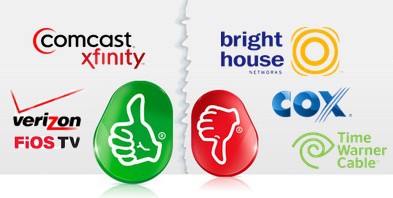
ZatzNotFunny rates TWC, Bright House and Cox as unfriendly to alternative set-top boxes like TiVo. (Image: ZatzNotFunny)
Wikipedia supplies insight into the available CCI options cable operators can choose to use for cable television channels:
- 0x00 – Copy freely – Content is not copy protected.
- 0x01 – Copy No More – A copy of the content has already occurred and no more copies are permitted.†
- 0x02 – Copy Once – One recording can be made, but it cannot be copied to another device.†
- 0x03 – Copy Never – the content can be recorded and viewed for 90 minutes after transmission, and is not transferable.†
- 0x04 – Content is Copy Once for digital output, but would have Macrovision 7 Day Unlimited restriction applied on the analog outputs. This affects content viewed either on an HDTV with component cabling or on a standard definition TV. It also affects content saved to VCR or DVD when the recorder is connected to an analog output on the DVR.†
- 0x07 – Content is Copy Never for digital content (deleted after 90 minutes) and Macrovision 7 day/24 hour for content recorded from analog channels. Content cannot be transferred via TiVoToGo transfers or MRV, and cannot be saved to VCR or DVD.†
† – Any live stream with a CCI flag set higher than 0x00 is to be encrypted or protected in a way that only trusted platforms that will obey the flag (Such as Microsoft’s PlayReady system used in Windows Media center) can access it.
A Time Warner Cable customer known as MachineShedFred noticed this problem first hand and wrote about it in a complaint to Time Warner Cable back in March, and Stop the Cap! reader Chris N. pointed us to this ongoing issue:
The only software that allows me to use the CableCARD hardware that you officially support and distribute is Windows Media Center, which Microsoft is no longer developing, and is no longer distributing. All other DVR software available for every platform will not work, as they cannot decrypt the video stream due to the abuse of the CCI flag.
No other cable company in the US abuses the CCI flag in this manner, and every other cable subscriber in the US that isn’t on Time Warner has a wide choice of solutions for enjoying their service better than we can as your subscribers. Why are you restricting the choices of your subscribers for no reason? It’s clearly not contractual from the media networks, as they would have pushed for the same stipulations with at least one of your competitors. Yet, anyone outside of TWC’s monopoly can use any other software they want.
When even Comcast allows their subscribers more subscriber-friendly choices, you know you’re doing it wrong. Please revisit this ridiculous policy and cease the overuse of the CopyOnce CCI flag that unduly burdens your subscribers by forcing them to replace perfectly good hardware, or replace YOU.
 Some believed this problem could eventually resolve itself with Charter Communications’ buyout of Time Warner Cable and Bright House Networks. Would Charter bring their own policies to affected TWC/BH customers, or will Charter customers soon have to contend with the CCI CopyOnce flag loved by Time Warner Cable as well.
Some believed this problem could eventually resolve itself with Charter Communications’ buyout of Time Warner Cable and Bright House Networks. Would Charter bring their own policies to affected TWC/BH customers, or will Charter customers soon have to contend with the CCI CopyOnce flag loved by Time Warner Cable as well.
An official complaint to the FCC brought a cryptic non-answer answer from William Wesselman, Time Warner Cable’s regulatory compliance counsel. Wesselman implied the liberal use of the CCI CopyOnce flag was the result of restrictions in contracts with major programmers, which seems unlikely because other cable operators — larger and smaller — have successfully navigated around this issue. Wesselman’s answer implies as Time Warner Cable and Bright House are brought into the Charter hegemony, “the policies of the two companies will ultimately become the same.”
Of course, he never defines which policy Charter, TWC and BH customers across the country will eventually get by sometime in 2017.
Mr. Wesselman’s full response:
At this time, TWC and Charter continue to integrate their two systems into one. Both TWC and Charter, like other distributors of multichannel video programming, negotiate the distribution rights for the content it carries independently with individual rights holders. These bilateral commercial negotiations take into consideration many different factors, include the content protection and digital rights management requirements of the rights holder; applicable law, license and regulations; and the interests of subscribers. Each of these commercial negotiations, and the terms of the agreements that result, are unique to the specific distributor and programmer involved. As the integration of the two companies continues, Mr. X will notice that the policies of the two companies will ultimately become the same based on our agreements.
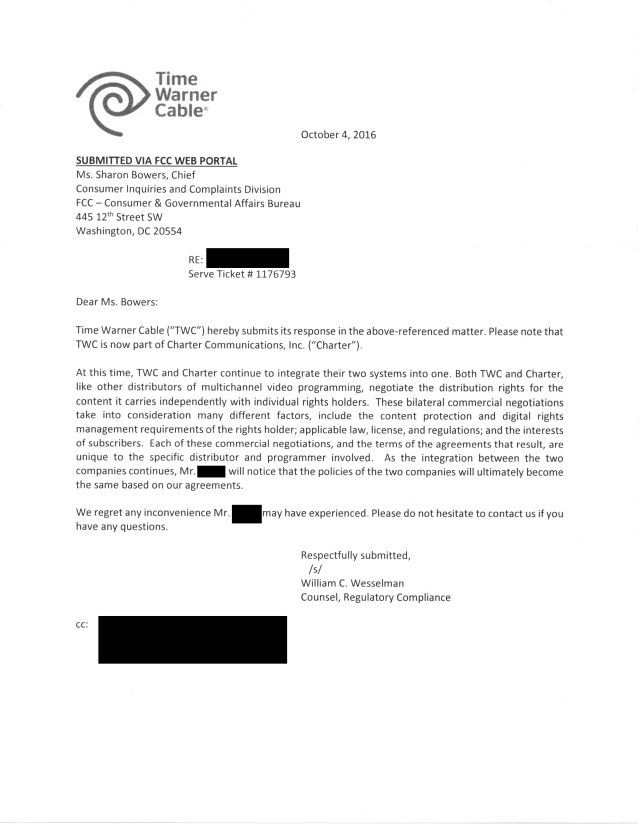


 Subscribe
Subscribe Arris will manufacture the next generation of set-top boxes for Charter Communications, supporting hybrid IP/QAM video and the legacy technology still in place at Charter-acquired Time Warner Cable and Bright House Networks.
Arris will manufacture the next generation of set-top boxes for Charter Communications, supporting hybrid IP/QAM video and the legacy technology still in place at Charter-acquired Time Warner Cable and Bright House Networks.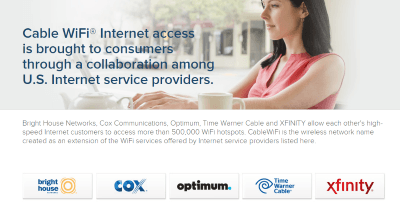 Comcast has confirmed new Altice USA and Charter Communications customers that used to subscribe to Cablevision, Time Warner Cable, and Bright House Networks will be able to continue accessing the free nationwide Cable WiFi roaming service, even though Altice and Charter are not members of the consortium that runs it.
Comcast has confirmed new Altice USA and Charter Communications customers that used to subscribe to Cablevision, Time Warner Cable, and Bright House Networks will be able to continue accessing the free nationwide Cable WiFi roaming service, even though Altice and Charter are not members of the consortium that runs it.
 There are big changes in store from Charter. First, the company will end distribution and support for Digital Transport Adapters (DTAs) — the small boxes designed for older analog-only TV sets. Charter expects you to have a traditional set-top box on every cable-equipped TV in the house. Second, it seems Whole House DVR service is being discontinued. Charter prefers the alternative of placing DVR boxes on each set where you want to record and watch TV shows. There is a significant cost for Time Warner Cable to install Whole House DVR service and it involves a technician coming to your home. Charter seems to want to cut truck roll expenses, and traditional DVR boxes are easy for customers to install themselves.
There are big changes in store from Charter. First, the company will end distribution and support for Digital Transport Adapters (DTAs) — the small boxes designed for older analog-only TV sets. Charter expects you to have a traditional set-top box on every cable-equipped TV in the house. Second, it seems Whole House DVR service is being discontinued. Charter prefers the alternative of placing DVR boxes on each set where you want to record and watch TV shows. There is a significant cost for Time Warner Cable to install Whole House DVR service and it involves a technician coming to your home. Charter seems to want to cut truck roll expenses, and traditional DVR boxes are easy for customers to install themselves.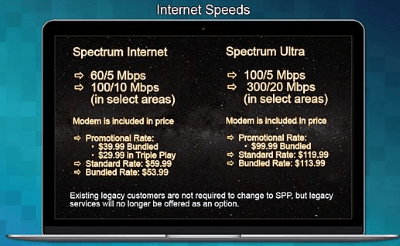
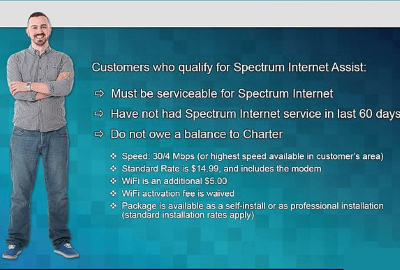 Charter’s discount plan for the income-challenged carries the usual restrictions. The most unconscionable effectively forces current Charter customers to go without internet access for 60 days before they can enroll in Spectrum Internet Assist. They also must not owe any past due balance to Charter.
Charter’s discount plan for the income-challenged carries the usual restrictions. The most unconscionable effectively forces current Charter customers to go without internet access for 60 days before they can enroll in Spectrum Internet Assist. They also must not owe any past due balance to Charter. Charter Communications is promising its Southern California customers it won’t bungle the transition from Time Warner Cable to Charter Communications like Frontier Communications
Charter Communications is promising its Southern California customers it won’t bungle the transition from Time Warner Cable to Charter Communications like Frontier Communications  But not all customers are happy about Charter’s slow transition plans. Customers waiting for Time Warner Cable Maxx upgrades, some already in progress, may be out of luck. Charter’s new management team put an indefinite hold on Time Warner’s more aggressive upgrade plans in favor of Charter’s much more modest commitment to offer customers two broadband speed tiers – 60 and 100Mbps over the next 18 months. Customers in the northeast and midwest have been told there are no longer any definitive dates for the introduction of Maxx, which offers free speed upgrades up to 300Mbps.
But not all customers are happy about Charter’s slow transition plans. Customers waiting for Time Warner Cable Maxx upgrades, some already in progress, may be out of luck. Charter’s new management team put an indefinite hold on Time Warner’s more aggressive upgrade plans in favor of Charter’s much more modest commitment to offer customers two broadband speed tiers – 60 and 100Mbps over the next 18 months. Customers in the northeast and midwest have been told there are no longer any definitive dates for the introduction of Maxx, which offers free speed upgrades up to 300Mbps.